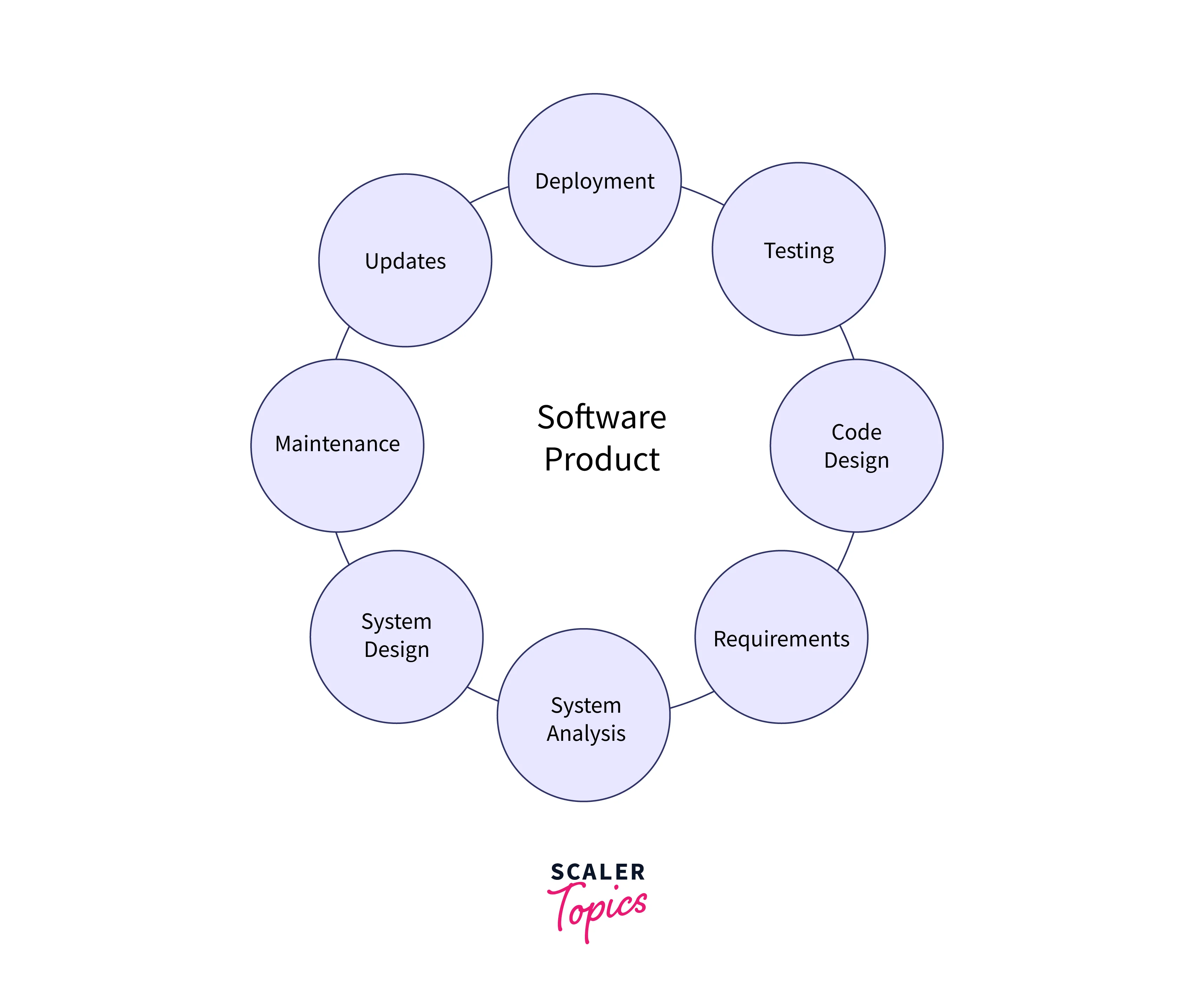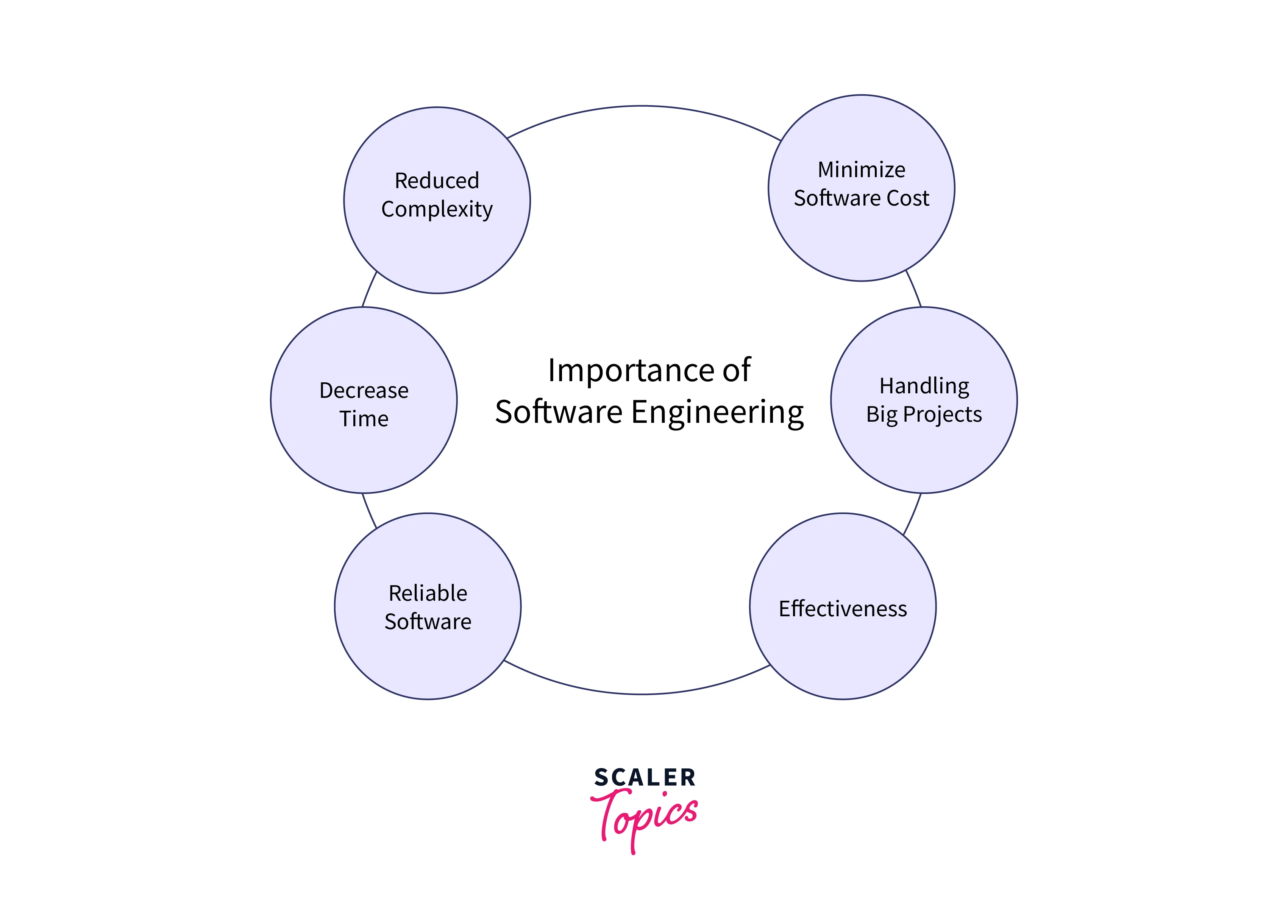7 min
What is Software Engineering?

Software engineering is the process of developing software that is functional and easy to update according to future requirements. Software engineering subject involves planning, designing, creating, testing, and maintaining software to make sure it's reliable and efficient.
We can think of it as building a house where we need to have a blueprint, use good materials, and follow the rules to make sure the house is safe (high-quality) and functional. In the same way, software engineers use tools, techniques, and standards of software engineering to build user-friendly, quality, and functional software that works as expected and can be easily updated when needed.
Why to Learn Software Engineering?
Software engineering is a skill that can lead to a fulfilling career with a lot of exciting possibilities. In today's digital age, software is everywhere, and the demand for skilled software engineers is constantly growing in the market.
One can use his/her skills to create software products or work for a company that develops software for different industries like healthcare, finance, e-commerce or even video games.
Software Engineering is a way of thinking that involves problem-solving, creativity, and attention to minute details. As a skilled software engineer, you must know to break down complex problems, analyze them, and come up with innovative solutions.
Also, technology is always evolving, there's always something new to learn and discover in software engineering. So if you're looking for a challenge and a skill that can make a difference, software engineering might just be the perfect fit for you.
Audience
If you're a student, software developer, or an IT professional looking to learn or improve your software engineering skills or to know what is Software Engineering, this Software Engineering Tutorial is for you! Whether you're new to software engineering or just looking to expand your knowledge, this Software Engineering Tutorial will help you define Software Engineering to get a better idea and build high-quality and reliable software and applications.
Prerequisite
The best thing about this Software Engineering Tutorial is that you don't need to be a coding wizard or a software pro to have a grip on this! All you need is a curious mind and a desire to learn about software engineering. We will start with the basics and will gradually move to more advanced concepts, so you won't be left behind!
Areas where Software Engineering is Used?
Here are the top 5 areas where software engineering is being used heavily:
- Healthcare:
Software engineering is used to develop systems for managing patient records, medical equipment, and diagnostic tools and also to improve patient health in some cases. - Finance:
Software engineering is used to develop software for handling and managing financial transactions, analyzing data, and handling online payments and banking for all sorts of traffic and loads. - Transportation:
Software engineering is used to develop systems for transportation too. It is being used in many areas of transportation, some of which include techniques such as optimizing routes and saving costs. It's also being used in developing self-driving cars and other autonomous vehicles. - Entertainment:
Software engineering is used to develop audio-video games, animations, and motion effects software for the movie industry. It also plays a role in developing music and video streaming services. - E-commerce:
Software engineering is also used widely to develop e-commerce platforms, and online marketplaces helping to sell products and services online and manage their transactions securely.
Applications of Software Engineering
Here are some of the applications of software engineering:
- Web Development:
Software engineering is used to develop websites, web applications, and other online services. From small business websites to large e-commerce platforms, software engineering plays a crucial role in building the digital world. - Mobile App Development:
Software engineering is used to create mobile applications for iOS and Android platforms. These apps range from social media platforms to gaming applications, and from productivity tools to healthcare apps. - Artificial Intelligence:
Software engineering is used to develop AI systems, including machine learning algorithms, natural language processing, and robotics. These systems are used in various industries, such as healthcare, finance, and transportation. - Cybersecurity:
Software engineering is used to develop software and tools for protecting computer systems, networks, and data from cyber threats. From antivirus software to intrusion detection systems, cybersecurity is an essential area of software engineering. - Data Science:
Software engineering is used to develop software for data analysis, visualization, and management. Data science is used in various industries to extract insights from large data sets, such as healthcare, finance, and marketing.
Characteristics of Software Engineering
Some of the characteristics of Software Engineering are as follows:
- Iterative and incremental:
Software engineering is an iterative and incremental process that involves developing and testing software in small increments. This approach allows for feedback and adjustments along the way, which leads to a higher-quality end product. - Emphasis on quality:
Quality is a critical aspect of software engineering, and software engineers place a high emphasis on developing software that is reliable, efficient, and easy to use. This involves testing the software thoroughly and making sure it meets the desired specifications and requirements. - Collaborative:
Software engineering is a collaborative process that involves different teams working together, such as developers, testers, and project managers. Effective communication and collaboration are essential for the success of software engineering projects.
Advantages of Software Engineering

- Reduced Complexity:
One of the primary advantages of software engineering is that it helps to reduce the complexity of software development projects. Emphasis are laid on the importance of careful planning, analysis, and design, which can help to simplify the development process and make it easier to manage. - Minimize Software Cost:
Software engineering practices also help to minimize the cost of software development projects with the help of efficient coding techniques, rigorous testing, and quality control processes. Software engineering practices can help to reduce the amount of time and effort required to develop software, which in turn can help to lower costs. - Handling Big Projects:
Another advantage of software engineering is its ability to handle big projects. Software engineering practices can help to break down large, complex projects into smaller, more manageable components, making it easier for the team members working towards the same goal. - Effectiveness:
Software engineering practices also help to ensure that software development projects are completed more effectively by emphasizing the importance of collaboration, communication, and continuous improvement and ensuring that efforts are aligned with business goals. - Reliable Software:
Software engineering practices also help to ensure that software is reliable and of high quality by rigorous testing and quality control processes, eliminating defects, errors, and other issues that could impact the performance and reliability of software. - Decreased Time:
Software engineering practices can help to decrease the time required to develop softwareby using efficient coding techniques, automated testing, and other productivity tools to streamline the development process and reduce the amount of time required to develop, test, and deploy software.
About this Software Engineering Tutorial
In this Software Engineering Tutorial, we will cover:
- What is Software Engineering in detail so as to get an overview.
- Introduction to Objectives of software engineering - Maintainability, Efficiency, Correctness, Reusability, Testability, Reliability, Testability, Reliability, Portability, Adaptability, and Interoperability of software systems.
- Knowledge about Software Design Levels such as High-Level Design and Low-Level Design
- Knowledge of Bad and Good User Interfaces and the importance of good UI
- Software Requirements Specification for the blueprint of the software, data flow diagrams and UML Diagrams for a better understanding of complex software
- The whole lifecycle of a project from blueprint to production in the Software development life cycle (SDLC)
- Object-Oriented Design and Principles for better Management of Software Modules
- Software architecture such as MVC and Microservice architecture for better performance and achieving atomicity.
Take-Away Skills from this Software Engineering Tutorial
Upon completing this Software Engineering tutorial, you should have a good understanding of how to use the software engineering principles and patterns to be able to apply this knowledge to your projects to build world-class software. Specifically, you should be able to:
- Define Software Engineering
- Know about Design Thinking
- Know Bad and Good UI
- Differentiate and know Importance of Good UX and UI
- Understand Software Requirements Specification and UML Diagrams
- Understand Software development life cycle (SDLC)
- Know Object-Oriented Design and Principles
- Know Software architecture such as MVC and Microservice architecture
Happy learning!!
